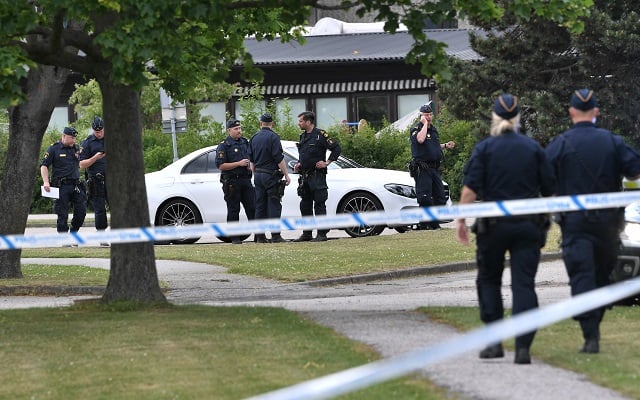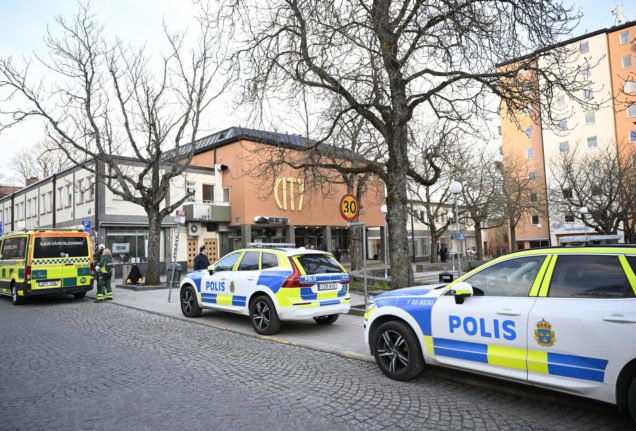“You strengthen your own gang by eliminating an external threat and you gain prestige,” Eddy Paver, a reformed former member of a biker gang, told AFP.
Paver was long willing to pay the ultimate price in order to “belong” to a criminal gang which required absolute loyalty from its members. “It's about strengthening the sense of community and showing who's the toughest,” the 47-year-old former convict explained.
Last year more than 300 shootings resulted in 45 deaths and 135 injuries in Sweden.
While the overall homicide rate remains one of the lowest in the world, with one per 100,000 inhabitants according to police statistics, deadly shootings have been steadily rising and last year reached record levels. 2019 is also on track to create another unwanted record. In Stockholm the first six months of the year have seen as many killings as the whole of 2018.
READ ALSO:
- Rise in gun deaths among young men in Sweden
- Stockholm sees spike in gun deaths – but Malmö and Gothenburg go months without fatal shootings
- Stockholm police officer goes viral with call for help fighting gun crime

Christoffer Bohman, a police officer in one of the designated vulnerable areas, whose appeal for public help went viral in Sweden. Photo: Janerik Henriksson/TT
Most of the shooters and victims are unemployed young men with immigrant backgrounds, under 30 years of age, living in disadvantaged neighbourhoods and often without a high school diploma.
“If you don't feel like you belong anywhere, you're struggling with the language (Swedish), and you see these guys who sell drugs, they have gold chains, they drive fancy cars, they get to sleep with the girls. It's not hard to find your way there,” said Paver.
'Vulnerable areas'
Like in other Europeans cities, you find many of Sweden's struggling housing projects at the end of metro lines. Other designated “vulnerable areas,” with elevated levels of violence, are found in inner cities, as in Malmö in the south.
Buildings are generally in good condition, schools properly equipped and streets clean, but social issues, unemployment and a high proportion of foreign-born inhabitants often facing extra challenges lead to segregation, school drop-outs and drug trafficking.
“Some shootings are connected to the trade of narcotics, internal conflicts or when someone has been cheated out of money… But many times it can be about honour. You can get screwed over by someone in the same gang, fights over cliques or girlfriends. The level justifying a retaliation is quite low,” Gunnar Appelgren, police commissioner in Stockholm, told AFP.
LONG READS:
- Why Swedish gangs use hand grenades (and what the country is doing about it)
- How women and mums are working to make Sweden's suburbs safer
- Working on the front line in Stockholm's vulnerable suburbs
 Fittja, one of the vulnerable areas in Stockholm. Photo: Lee Roden/The Local
Fittja, one of the vulnerable areas in Stockholm. Photo: Lee Roden/The Local
“Gangs have no institutional recourse to resolve conflicts… The motive for settling a score is not always important. It's about saving face,” said Torbjorn Forkby, a Professor of Social Sciences at Linnaeus University.
The most badly affected areas are the capital Stockholm, and Malmö and Gothenburg, but violence has also started to spread to medium-sized cities.
The weapon of choice for gangs are Kalashnikov automatic rifles. Imported from the Balkans, they are available for between 2,500 and 3,500 euros (around $2,800 to $3,950), although they become “more expensive in the event of an open conflict,” according to Appelgren.
Sweden's gang members have also been using grenades and explosives to settle their scores. On June 7th a bomb placed in a bicycle shed destroyed the facades of two residential buildings, causing damages to over 200 apartments in the city of Linköping, a two-hour drive south of Stockholm. Miraculously it caused no serious injuries.
'Tearing apart society'
Some efforts by authorities have helped reduce local tensions. The city of Malmö has adopted the Group Violence Intervention (GVI) programme, implemented in Boston in the 1990s though its impact is still uncertain.
The right-wing and far-right opposition have been critical of Social Democratic Prime Minister Stefan Lofven's “laxity” in responding to the shootings. They have been calling in particular for the abolition of a prison penalty “discount” when it comes to the incarceration of people under 21 years of age.
“This violence is tearing apart society as we know it and the country we want Sweden to be,” conservative MP Johan Forssell said during a recent debate on gangs in parliament.
READ MORE:
- CRIME MAP: This interactive map shows the explosions in Malmö in 2019
- Malmö calls gang suspects to meeting in hope to stop shootings
- Crime in Sweden: a look at where the fatal shootings happen
The government for its part has said that a repressive response is not enough and has called for a joint mobilization of civil society and law enforcement.
“The shootings and gang crime can only be uprooted if police efforts are combined with a strong social sector and a good school,” PM Lofven told the parliament last month.
Eddy Paver, who now works at a drug rehab centre, also believes that a mere judicial response would be insufficient.
“You can't punish away the problem. Penalties for possession of illegal weapons have already been heightened and that hasn't helped. You have to start earlier, what we need is life training in school, teaching kids what's right and wrong”.
By Gaël Branchereau with Camille Bas-Wohlert in Malmö



 Please whitelist us to continue reading.
Please whitelist us to continue reading.
Member comments